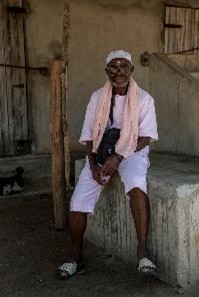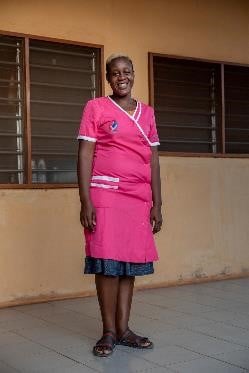ENSEMBLE project: providing information and support every day
Through the ENSEMBLE project, HI is pushing for a change in behaviour. The project is based on the active participation of beneficiaries and a gender-based analysis, including frequently excluded groups such as people with disabilities.
HI runs various events, such as open days at family planning centres, educational plays, open discussion sessions, etc. During these meetings and discussions, which are supervised by HI-trained midwives, women are told about existing contraception options and a number of popular misconceptions are dispelled. Some people believe, for example, that contraception causes sterility or transmits diseases such as malaria. At these sessions, women can also, if they so wish, obtain contraceptives supplied by the Togolese government.
The ENSEMBLE project is part of the Government of Canada's comprehensive approach to sexual and reproductive health and rights. It is funded by Global Affairs Canada and carried out in partnership with CARE Canada.
A project addressing a public health issue
In West Africa, hundreds of women die every day from complications related to pregnancy or childbirth, according to the West African Health Organisation. By using contraception, women can take control of their sexual and reproductive health and maintain their overall health.
Rallying the community around women
To open up the discussion on sexual and reproductive health issues in the community, HI has mobilised various civil society actors to create awareness-raising committees, including traditional and religious leaders, women's groups, students, government representatives, HI specialists and healthcare providers. At the end of each activity, the community makes resolutions that all participants commit to implementing in their daily lives.
Johnson Jean Apanh, 67, is a traditional Etro Kpetodeka (voodoo) chief and a member of HI's outreach committee in Agouégan, in the south of the country. Along with the pastor, the deputy headmaster of the secondary school and the parish priest, this influential man attended all the project meetings in his community. He has since spoken to the parents of high school students to encourage them to talk to their children and advise them on their sexual health, which requires a great deal of understanding and patience.
"We want the best for our children's future, so we have to raise awareness to give them a voice. It's a duty for all of us,” he tells us, with conviction
Long-term educational work
Akoko Sogbadji, 34, a midwife for 12 years, has taken several training courses with HI on sexual and reproductive health, dialoguing with young people and gender-based violence. According to Akoko, the change in mentality is only just beginning and will take time. She still faces major obstacles, including prejudice and traditional beliefs opposed to family planning.
However, there has also been progress since she started practising her profession. In particular, Akoko cites the financial support provided by the Togolese government for caesarean sections, as well as certain medicines that are now supplied to pregnant women.
Akoko also hosts a radio programme on issues relating to women's health and maternal and reproductive health. She says she loves sharing, giving and learning.
Talking to young people – a priority
"Before, we midwives weren't trained to deal with young people. A lot of things happened because we couldn't discuss sexuality freely with them. We didn't talk about it, so they discovered it on their own, and if it was an unhappy experience, too bad; if it was a happy one, so much the better. The new training courses have had a positive impact on their health. Now they dare to approach us. They are no longer afraid of being turned away from the health centre because they know that here, we really listen to them.”
Akoko puts this listening into practice on a daily basis, using a phone that HI has given her. She gives her WhatsApp contact to all the young people she meets during workshops at the health centre. They know they can call her if they have a problem. She makes herself as available as possible to support them.
Before being trained by HI, Akoko was apprehensive about discussing certain subjects, even with her own children. But now she knows that silence is not the best solution. She has learnt to build a relationship of trust with young people, so that they feel free to talk about intimate subjects. Once young people have found someone whom they trust and who listens to them, they open up a lot more.
Launched in 2020, the "Education necessary for equitable sexual and reproductive health in order to take control of one's well-being and be free to make one's own choices" project aims to improve access to sexual and reproductive health services and related rights, with a focus on women and adolescent girls, including those with disabilities. The project adopts a social and behaviour change approach based on the active participation of beneficiaries and a gender-based analysis, including excluded groups such as people with disabilities.
To date, the ENSEMBLE project is:
• 207 community dialogues
• 262 community health workers and peer educators trained
• 2,382 beneficiaries of contraception services
• 23,635 people informed via awareness-raising
• 3 countries covered: Togo (Maritime region), Ivory Coast (Gbeke region) and Senegal (Kolda region)







